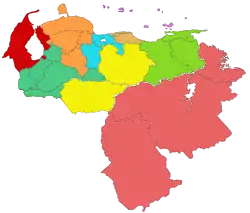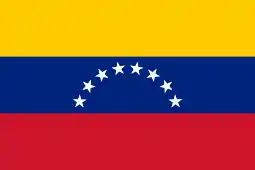Regions of Venezuela
The Regions of Venezuela (Spanish: Regiones de Venezuela) are two groupings of Venezuela's states, capital district, and federal dependencies. Venezuela's natural regions (Regiones naturales) are divided by natural geography, and administrative regions (Regiones político-administrativas) are delineated for the purpose of regional administration.
Natural regions
.png.webp)
Natural regions (Regiones naturales) are grouped based on a natural region, regardless of population or development, and formed from geo-physical criteria such as geological constitution, relief, climate, hydrography, vegetation, soils, and others.[1] Venezuela is considered one of 18 Megadiverse countries by Conservation International, and the Natural regions do not always correspond exactly to the borders of the states.
Venezuela is divided into eight Natural regions:[2]
Administrative regions
Administrative regions (Regiones político-administrativas) are grouped from Venezuela's neighboring states, federal dependencies, and the capital district for the purpose of local administration in the process of regional development. The Political-Administrative regions were created from a decree on 11 June 1969 and have been modified since their creation, and there are currently nine regions.

| Administrative Region | Population¹ | Area² | States |
|---|---|---|---|
| Andean Region | 3,911,278 | 56,700 km² | Barinas, Mérida, Táchira, Trujillo and the Páez Municipality of Apure |
| Capital Region | 4,687,002 | 9,879 km² | Miranda, Vargas, Capital District (Caracas) |
| Central Region | 3,851,290 | 26,464 km² | Aragua, Carabobo, Cojedes |
| Central-Western Region | 3,703,675 | 66,900 km² | Falcón, Lara, Portuguesa, Yaracuy |
| Eastern Region | 3,165,217 | 84,030 km² | Anzoátegui, Monagas, Sucre |
| Guayana Region | 1,776,545 | 458,344 km² | Bolívar, Amazonas, Delta Amacuro |
| Insular Region | 439,900 | 1,492 km² | Nueva Esparta, Federal Dependencies |
| Llanos Region | 1,181,650 | 141,486 km² | Apure (excluding the Páez Municipality), Guárico |
| Zulian Region | 3,520,376 | 63,100 km² | Zulia |
Notes:
- Population figures are 2005 estimates
- The area of the Páez municipality has, for the time being, been incorrectly counted here as belonging to the Llanos Region, rather than the Andean Region.
